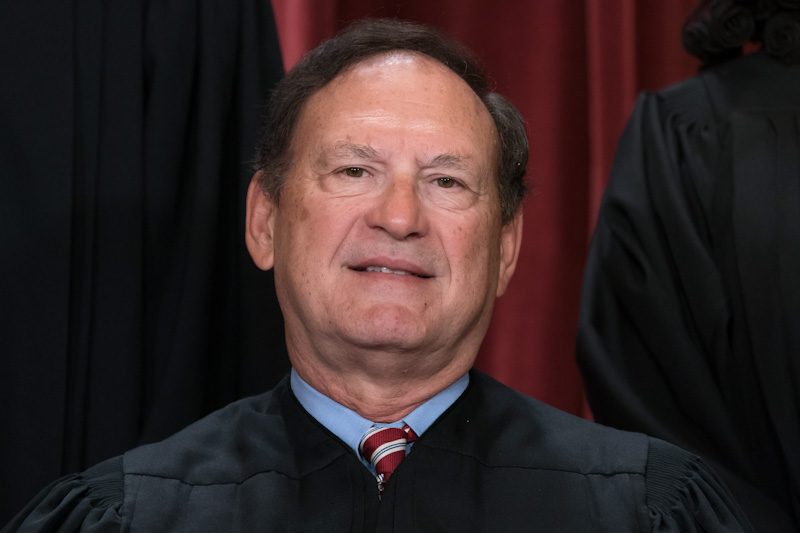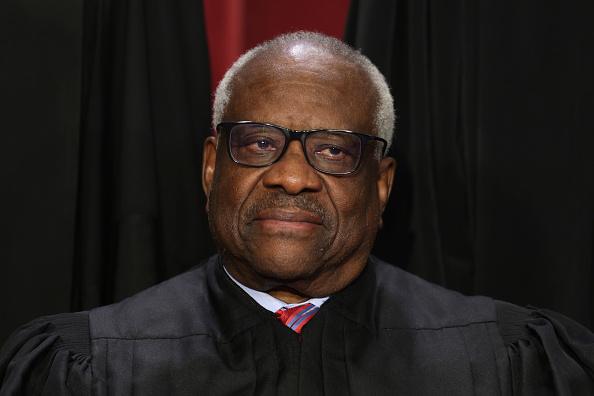Alito uses op-ed page to defend undisclosed free Alaska trip on private jet

According to ProPublica, U.S. Supreme Court Justice Samuel Alito flew to Alaska on a private jet owned by a hedge fund billionaire, and he stayed at a lodge owned by a mortgage company entrepreneur. Photo by J. Scott Applewhite/The Associated Press.
U.S. Supreme Court Justice Samuel Alito defended his free 2008 vacation to an Alaskan fishing lodge in a column published Wednesday in the Wall Street Journal, about five hours before ProPublica reported on the trip.
According to ProPublica, Alito flew to Alaska on a private jet owned by hedge fund billionaire Paul Singer, and Alito stayed at the King Salmon Lodge, which was owned by mortgage company entrepreneur Robin Arkley II. Singer and Arkley were major donors to conservative causes.
The Washington Post summarized the ProPublica article and reported on Alito’s op-ed in the Wall Street Journal. Alito’s column “was an unusual public venture by a Supreme Court justice into the highly opinionated realm of a newspaper editorial page,” the Washington Post said.
Alito wrote the column after refusing to answer questions submitted to him by ProPublica.
The Alaska trip was arranged by Leonard Leo, the Federalist Society leader who was reportedly part of a team who prepared Alito for his Supreme Court confirmation hearing. Leo recruited Singer to give Alito a seat on his private plane flight to the lodge.
ProPublica described the King Salmon Lodge as “a luxury fishing resort that drew celebrities, wealthy businessmen and sports stars.” Alito countered in the Wall Street Journal that he stayed in a “modest one-room unit” at the lodge, which he described as “a comfortable but rustic facility.”
 Photo of Justice Clarence Thomas by Alex Wong/Getty Images.
Photo of Justice Clarence Thomas by Alex Wong/Getty Images.Related article from ABAJournal.com: “Billionaire who treated Justice Thomas to vacations also bought property from him and his relatives”
Alito did not report the free accommodation or the jet flight, which would have cost more than $100,000 one way if he had chartered the plane.
After the trip, ProPublica reported, “Singer’s hedge fund came before the court at least 10 times in cases where his role was often covered by the legal press and mainstream media. In 2014, the court agreed to resolve a key issue in a decadelong battle between Singer’s hedge fund and the nation of Argentina. Alito did not recuse himself from the case and voted with the 7-1 majority in Singer’s favor. The hedge fund was ultimately paid $2.4 billion.”
Charles Geyh, a professor at the Indiana University Maurer School of Law and a recusal expert, criticized the arrangement in an interview with ProPublica.
“If you were good friends, what were you doing ruling on his case?” Geyh said. “And if you weren’t good friends, what were you doing accepting this” flight on a private jet?
Alito said he never discussed cases with Singer and made only small talk with the billionaire on the fishing trip. After that, Alito wrote, he spoke with Singer “on no more than a handful of occasions,” making only “brief and casual comments at events attended by large groups.”
A federal law requires Supreme Court justices and other federal officials to report most gifts. The law makes an exception for “personal hospitality” that includes “food, lodging or entertainment” on a person’s property.
Ethics experts who spoke with ProPublica said the law clearly requires disclosure of private jet flights.
“The typical interpretation of the law required disclosure for his stay at the lodge too, experts said, since it was a commercial property rather than a vacation home,” ProPublica reported. “The judiciary’s regulations did not make that explicit until they were updated earlier this year.”
In his column in the Wall Street Journal, Alito said justices “commonly interpreted” the hospitality exception to mean that accommodations and transportation to social functions were not reportable gifts.
“The flight to Alaska was the only occasion when I have accepted transportation for a purely social event, and in doing so I followed what I understood to be standard practice,” Alito wrote.
Had he taken a commercial flight to Alaska, Alito said, there would have been a “substantial cost and inconvenience” for U.S. marshals who would have accompanied him for security reasons.
Alito said he was not aware of Singer’s connections to entities in the Supreme Court cases cited by ProPublica. Singer was not listed as a party in the cases, and his name was not listed in the corporate disclosure statements or in petitions for or in opposition to certiorari, Alito said.
“It would be utterly impossible for my staff or any other Supreme Court employees to search filings with the [U.S. Securities and Exchange Commission] or other government bodies to find the names of all individuals with a financial interest in every such entity named as a party in the thousands of cases that are brought to us each year,” Alito said.
Leo told ProPublica that “no objective and well-informed observer of the judiciary honestly could believe that they decide cases in order to cull favor with friends or in return for a free plane seat or fishing trip.”
Singer said he did not arrange the Alaska trip and was not aware that Alito would be there when he accepted the invitation. Singer and his companies did not have business before the Supreme Court at the time.
Judge A. Raymond Randolph of the U.S. Court of Appeals for the District of Columbia Circuit, who took senior status in 2008, was also a guest on the King Salmon Lodge trip. He did not disclose that trip or a former free trip that he took to Kodiak Island, Alaska, that was also attended by then-Justice Antonin Scalia.
Randolph said he didn’t disclose the trips on the advice of the judiciary’s financial disclosure office. He shared his notes with ProPublica summarizing his call to the office about the prior trip, which read, “Don’t have to report trip to Alaska with Rob Arkley & others / private jet / lodge.”
See also:
ABAJournal.com: “Supreme Court justices should follow binding code of ethics, ABA House says”
ABAJournal.com: “Justice Thomas listed income from a real-estate firm even after it closed in 2006”
ABAJournal.com: “Justice Thomas’ financial disclosure issues referred to committee of federal judges”
ABAJournal.com: “Billionaire friend paid private school tuition for nephew of Justice Thomas”
Write a letter to the editor, share a story tip or update, or report an error.


